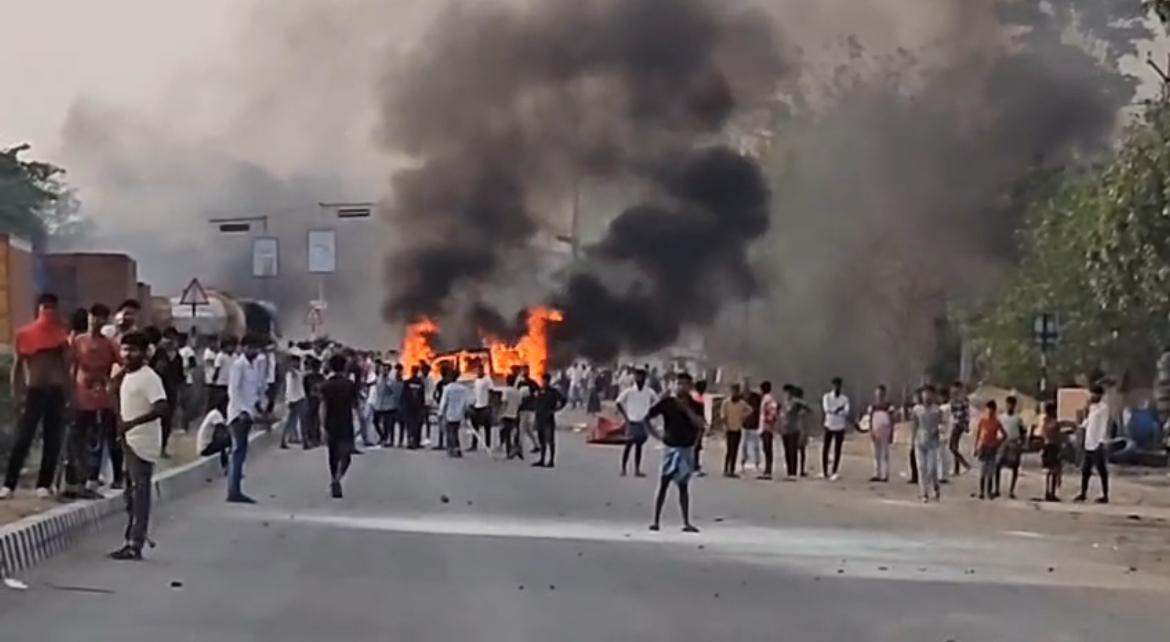West Bengal, India: Significant unrest unfolded on Friday in the Sajur Mor vicinity, under Suthi Police Station in the Murshidabad district of West Bengal, as demonstrations against the Waqf (Amendment) Act resulted in violent clashes between police and protesters. More than 110 people have been arrested by the Bengal Police.
Disturbance in Suthi and Shamsherganj
The disturbance involved thousands of individuals from the Suthi and Shamsherganj localities, largely belonging to the minority community, who had gathered in marches opposing the legislation. Flashpoints occurred when participants moved to obstruct National Highway 12 near Sajur Mor.
Police intervention aimed at preventing the highway blockade precipitated a rapid escalation. According to law enforcement accounts, the situation turned violent when some demonstrators allegedly targeted police personnel with stones and bricks. Reports also mentioned the alleged use of bombs by individuals in the crowd. These actions reportedly resulted in injuries to several police officers as well as some civilian bystanders. Eyewitnesses also mentioned attempts by some protesters to damage vehicles on the highway before police stepped in.
Over 110 People Arrested
The West Bengal Police has arrested over 110 people in connection with the violence that broke out in Murshidabad district during a protest over the Waqf (Amendment) Act. Police said the protests swept across Malda, Murshidabad, South 24 Parganas and Hooghly districts, leading to arson, stone-pelting and road blockades.
Raids were being carried out across all these districts, with over 110 people arrested in Murshidabad alone, police added. “About 70 people were arrested from Suti, and 41 people from Samserganj in connection with the violence,” a police officer told PTI.
Lathi charge by Police
To manage the escalating situation and disperse the assembly, police employed countermeasures including a lathi charge (baton charge). The deployment of tear gas shells and, reportedly, stun grenades was also noted as police worked to restore order. In the evening an intimation was placed before the BSF by the district administration for deployment and subsequently BSF had responded swiftly and and additional troops were deployed in the trouble prone areas of Suthi, Nimtita and other adjoining areas to restore law and order.
However, participants in the demonstration offered a contrasting narrative. They accused the police forces of initiating an unprovoked, heavy-handed response. Protester accounts alleged the use of batons, tear gas, and stun grenades amounted to excessive force without prior provocation from their side.
Warning from Bengal Police
Anand Roy, the Superintendent of the Jangipur Police District, acknowledged the dispatch of additional police units to the location. The situation reportedly remained volatile and unresolved until approximately 5 PM on Friday evening, even as authorities made public appeals for calm and peace.
Later on Friday night, an official update was posted on social media by the West Bengal State Police. It confirmed that order had been restored in the Suthi and Shamsherganj areas. The police stated that the agitated crowds were dispersed through their intervention and that traffic flow on National Highway 12 was normalized.
The announcement included a stern warning that rigorous legal action would be pursued against anyone found involved in the violence and disturbances. Police affirmed that operations were active to apprehend individuals responsible for inciting the conflict and also cautioned that legal steps would be taken against those spreading rumors related to the events.
Understanding the Waqf (Amendment) Act Protests
Context
The clashes reported in Murshidabad are the latest manifestation of ongoing opposition to the Waqf (Amendment) Act within the region.
Waqf Significance
Waqf properties are traditionally assets dedicated under Islamic principles for religious or charitable use, managed by statutory Waqf Boards.
Source of Conflict
The demonstrations are specifically directed against amendments made to the governing Waqf Act. While the precise nature of the amendment causing friction isn’t detailed in this report’s source material, it is the clear catalyst for the protests among concerned groups, primarily within the Muslim community.
Pattern of Unrest
Friday’s incident at Sajur Mor follows similar recent tensions and confrontations linked to the same legislation in other Murshidabad locations like Jangipur and Suthi.
Core Issue
The amended Waqf Act has become a significant point of dispute, mobilizing dissent and leading to repeated public order challenges in the district, reflecting anxieties about the law’s impact among the protesting communities.


